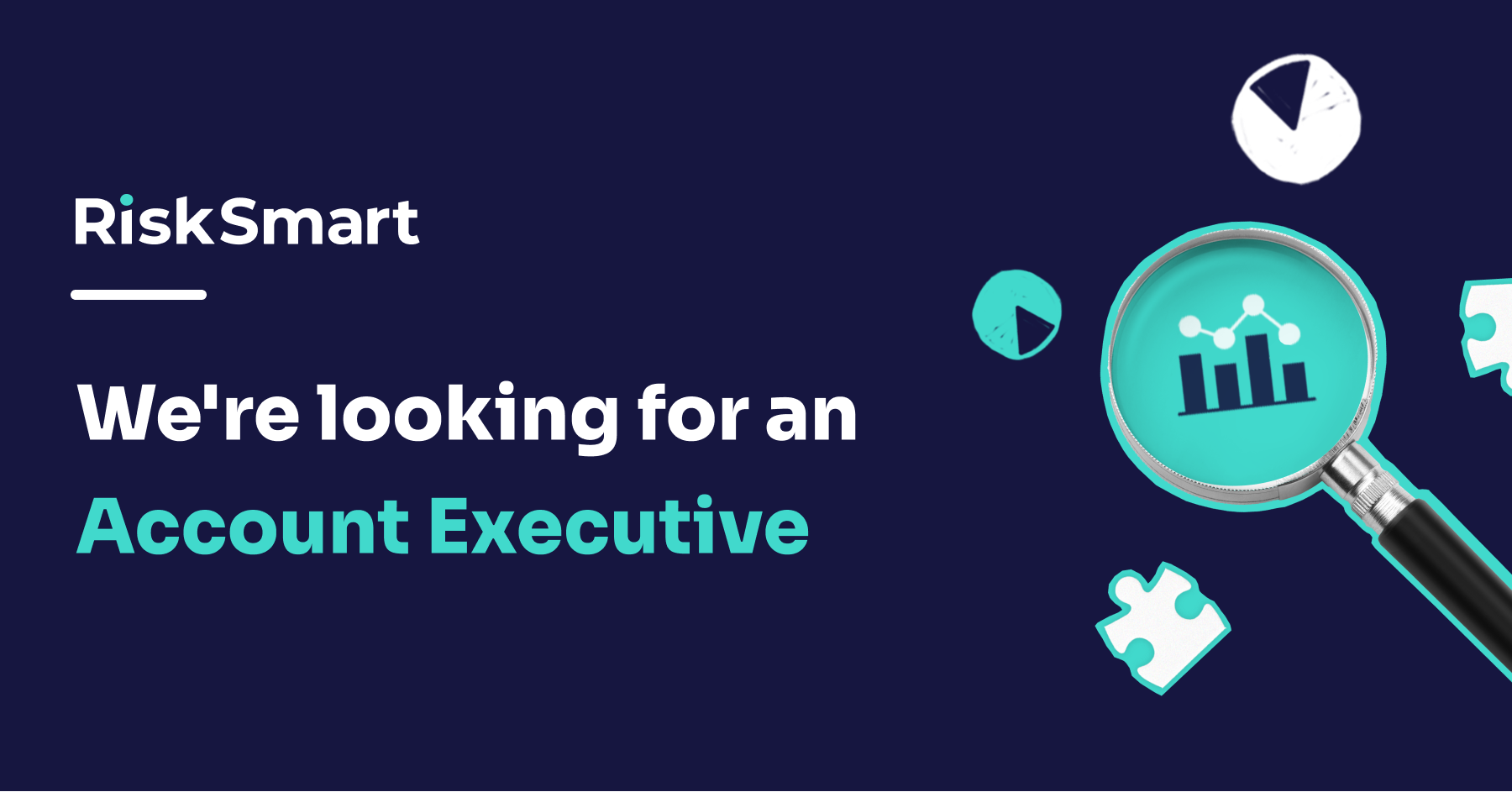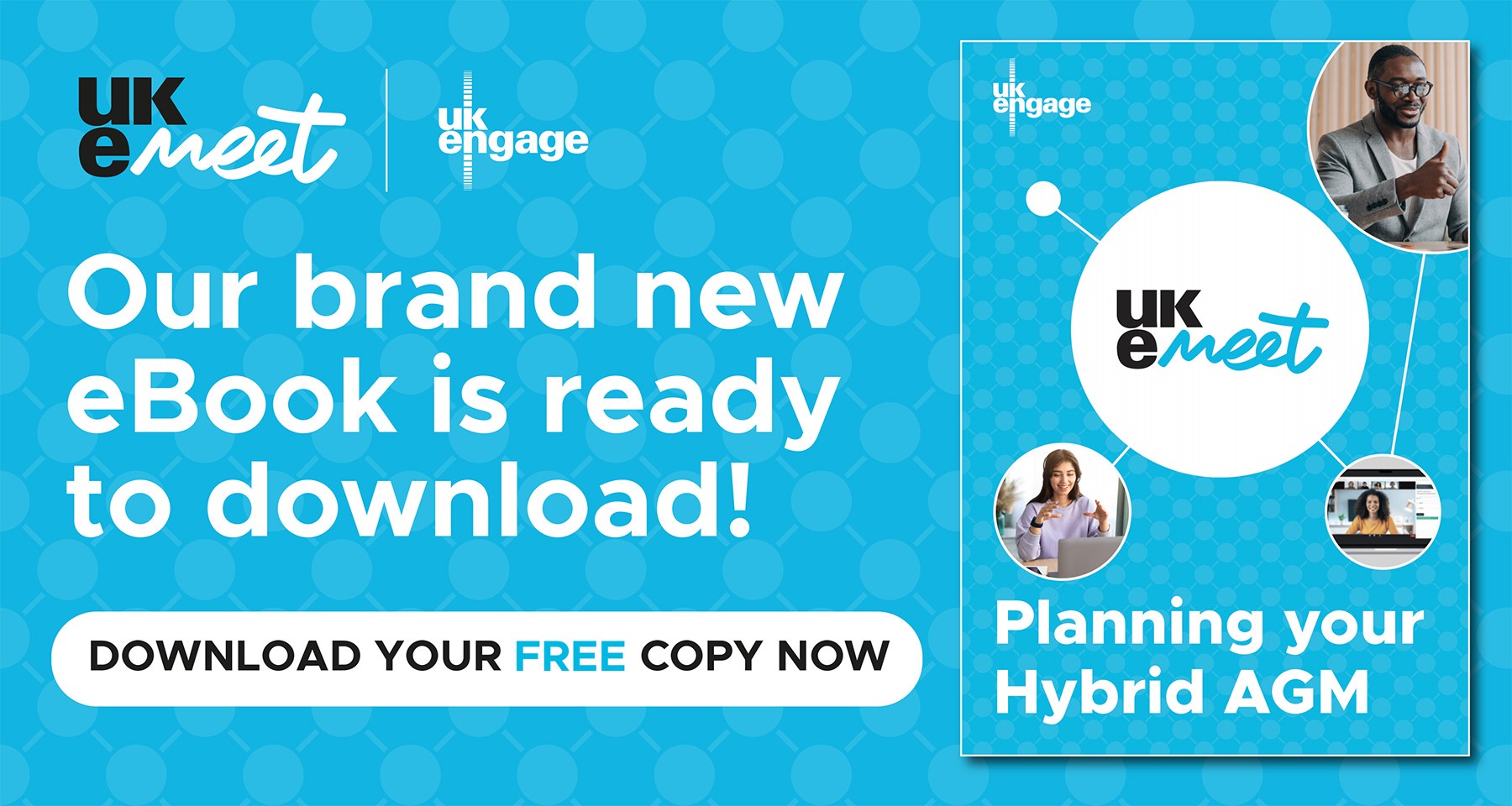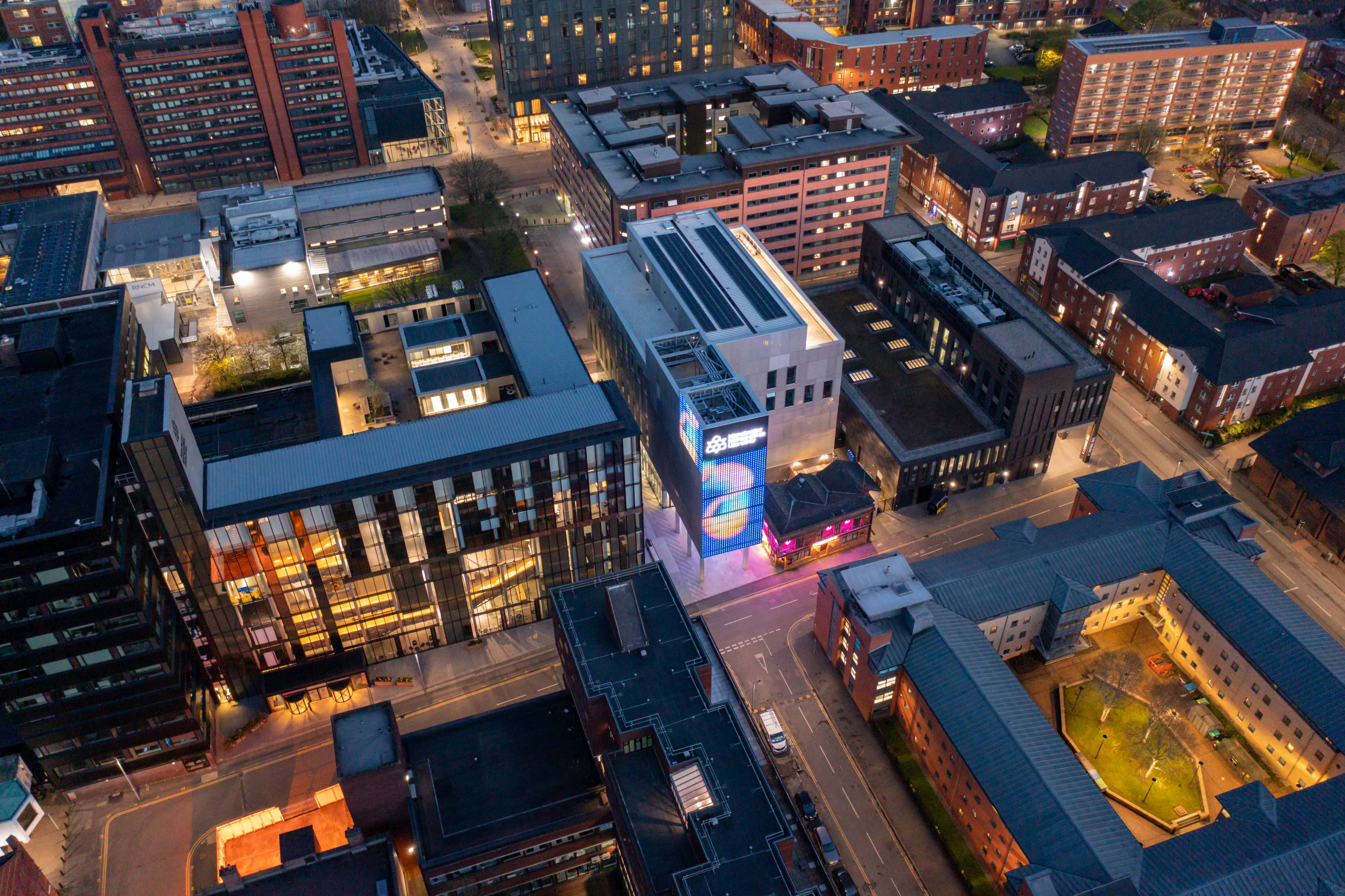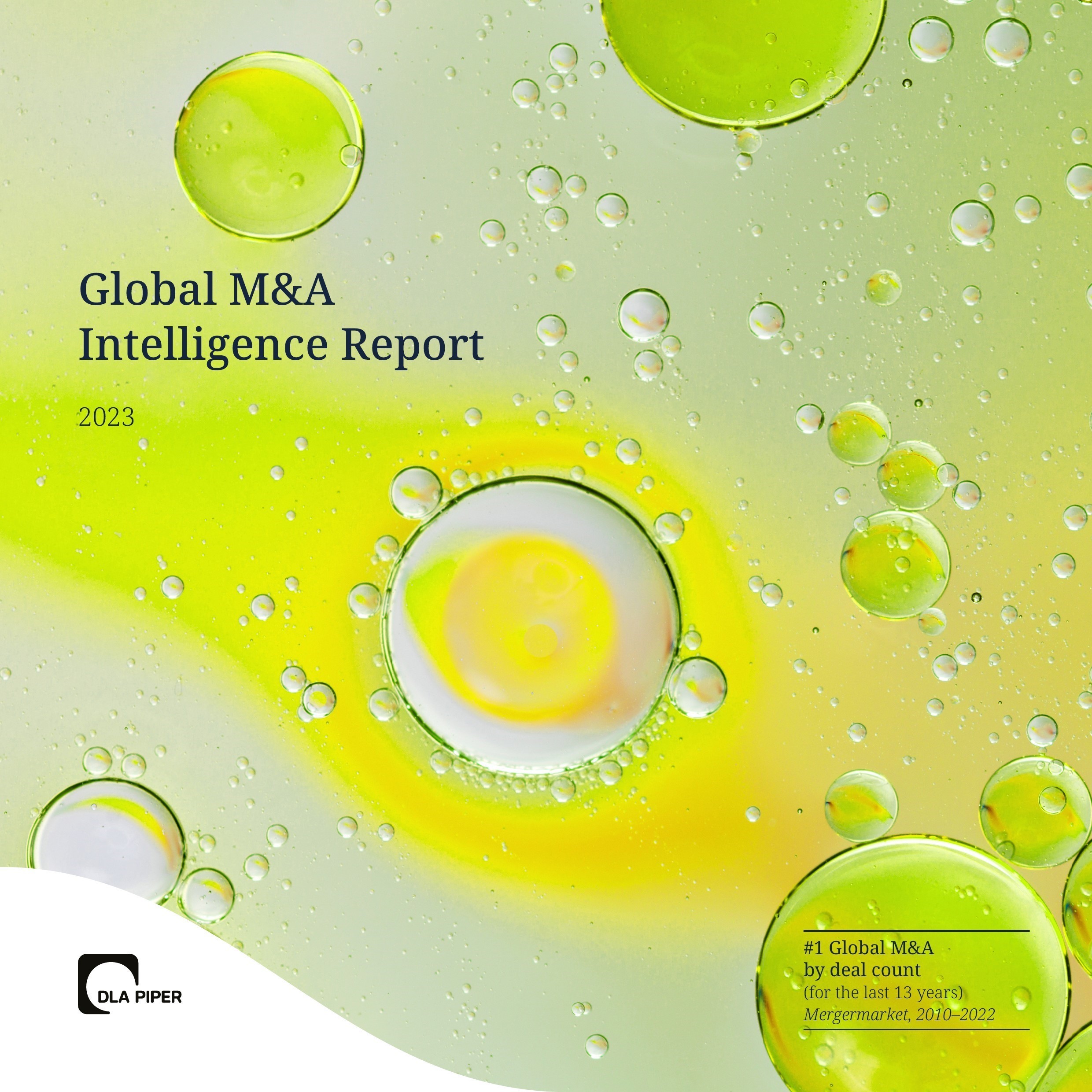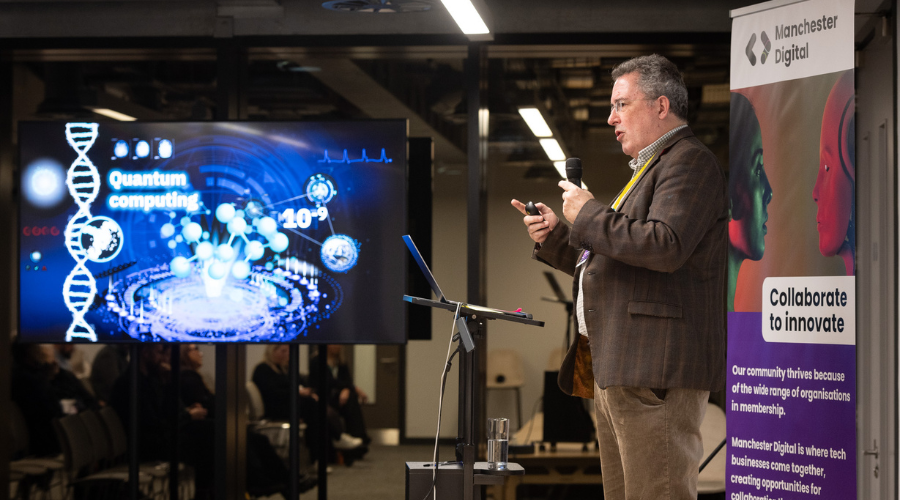
Manchester Digital brought together leading tech businesses and thought leaders for our Emerging Tech Conference at No 1 Circle Square. The event was sponsored by IBM, Amazon, NLighten and Bruntwood SciTech.
Despite the Manchester-style torrential rain outdoors, our delegates were kept happy with drinks and canapes, and more importantly, a range of thought-provoking talks and panels, with demo tech products as well.
Industrial Evolution
Vinnie Morton, Strategic Sales Lead at Siemens, started his talk by saying an article in the Business Insider said the metaverse is dead. However, Vinnie said that the Industrial Metaverse is about solving real world problems in a digital world. He gave the example of how manufacturers can use the industrial metaverse to build factories in the metaverse, which will hugely reduce prototype costs. Another great example is manufacturing protheses, where using the Industrial Metaverse for design can reduce costs by 90%. Siemen’s has a factory in Congleton which is using VR to improve productivity by 6% year on year.
Vinnie rounded up his talk by saying: “We could do without the hype - and should focus on what really matters and make a difference in the real world. We should look at real world benefits and scale across manufacturing. We have every reason to hope because never before have there been so many powerful technologies to deliver benefits.”
Panel: Everyday Immersion: Implementation of XR/ VR and spatial tech into daily lives
Our panel, hosted by Katie Gallagher, MD at Manchester Digital, consisted of: Seth White, Head of Immersive Experiences at Ride Shotgun; Alastair Peat, VR Developer, AP3D/ 3DW; David Dixon, Security Testing Pre-sales Consultant at Cyber Lab and Lukas Genever, Director at Cloud Imperium. The discussion centred around how virtual reality could be used in real-life situations.
Alastair said that while we don’t have mainstream adoption of VR, within the academic sphere there is currently a lot of hype around its potential. He added, “What I wanted to do was to develop functional solutions. For example, I have created a gamified version for nurses to help them train, and there are useful aspects within education and energy. If you can visualise big projects and experience in VR, then you can cut a lot of costs.”
Lukas talked about how VR has to be more user-friendly and cloud tech is the way forward to make it more accessible. He also gave a great example of how VR has been used as smell therapy for people who have lost their sense of smell after Covid or how it can be used to enhance video games playing experience.
Seth gave a good example where businesses use VR at exhibitions in order to engage and connect people, without having to push their sales agenda. He also spoke of how it can be used by big brands to enhance their storytelling. He worked with Oracle, who used a large screen of 25x10m, with augmented reality, to give a tour of a beehive.
David highlighted the cyber security aspects of VR and said, “In the race to market, quite often security can be an after thought. However, user safety should be paramount. We are still figuring out how VR could be used by bad actors. I heard an example where Harvard students hacked Meta Ray-Ban glasses and used them to collect metadata from people passing them on the street.”
Lightning talk: Tomorrow's World: qubits, neurons and robots
Richard Hopkins, Distinguished Engineer at IBM, gave a fascinating and engaging talk about how quantum computing can be used to create energy-efficient technology. Currently, the annual energy consumption for training AI is around 12 TWh and expected to grow. On top of this, currently within robotics, there isn’t currently good enough technology to make the batteries energy efficient. However, quantum technology will be much more energy efficient, so will enable us to create much more advanced technology.
He also spoke about how we need to find a way to create ethical guidelines around emerging technology and that this needs to be led by the industry. We all need to work together with the Government to create regulatory sandboxes around new tech advancements. He asked, “If we don’t lead this, then who will?”
Media Renaissance: Emerging technologies and content creation
This panel was hosted by Laura Harper, Partner at Lewis Silkin, with Criss Richards, Creative Technologist at McCann Manchester and Paul Caporn, Head of Architecture, iPlayer and Sounds at BBC.
Criss talked about how he was able to use a variety of AI tools to create concepts for content and advertising to showcase new projects for clients, but due to legalities and ethics, it still had to be re-created in real life. This was really insightful as it showcases what technology can do, but in reality, they have to examine the terms and conditions around each technology to protect themselves and their clients from potential legal action, as well as protecting the livelihoods of models, creatives, voice actors etc.
Paul talked through both the potential and the pitfalls of how the BBC can use emerging tech such as AI, for their content, particularly in how it could be used to improve accessibility. For example, generative AI could be used to create subtitles for audio content. However, there is such a vast amount of audio content, there would have to be a way for the generated subtitles to still be quality checked.
Closing talk: Digital Pioneering
Sinead Carse at Amazon, Partner leader EMEA, gave a really insightful talk through Amazon’s latest emerging tech. As a business which has always been at the forefront of emerging tech right from launch, it was interesting to hear about all the latest ways that the retail tech giant is still looking at making the purchase journey easier for customers.
The new shopping assistant is called Rufus, which uses generative AI to give personalised recommendations. Examples given were what food to order for a dinner party, with specific dietary requirements, or what to buy a seven-year-old girl for Christmas.
Another of Amazon’s new developments is filtered reviews, plus size recommendations. She also talked about Amazon Pharmacy, which makes what used to be a lengthy process into a very streamlined and easy process.
Amazon has invested more than £3bn into the UK’s economy this decade and from 2024-28 it will contribute £14bn to the UK. Sinead closed her inspiring talk by saying that very soon AI won’t be seen as an add-on service, it will simply be integrated into our lives and we won’t even notice it.
_
We’d like to say a huge thanks to our sponsors who made this event possible: Amazon, IBM, nLighten and Bruntwood SciTech.
Please check our upcoming Events Calendar for 2025.





